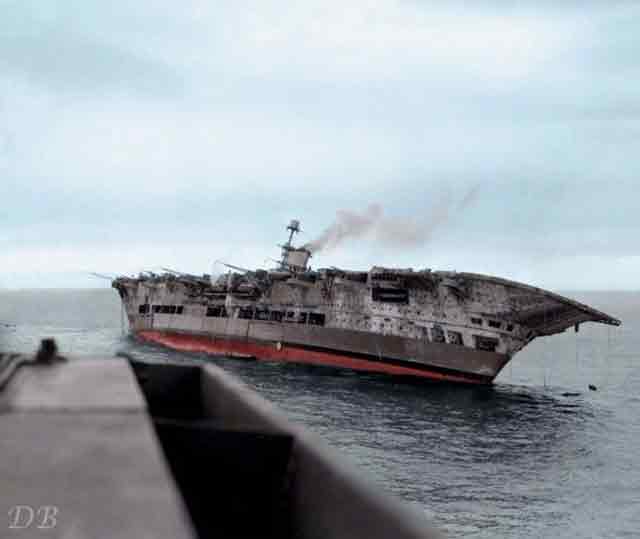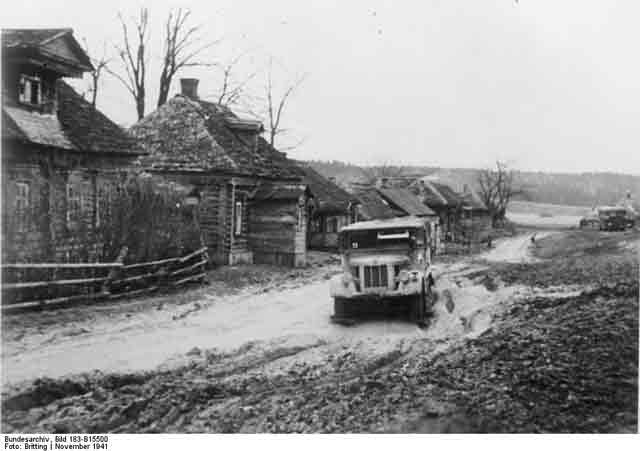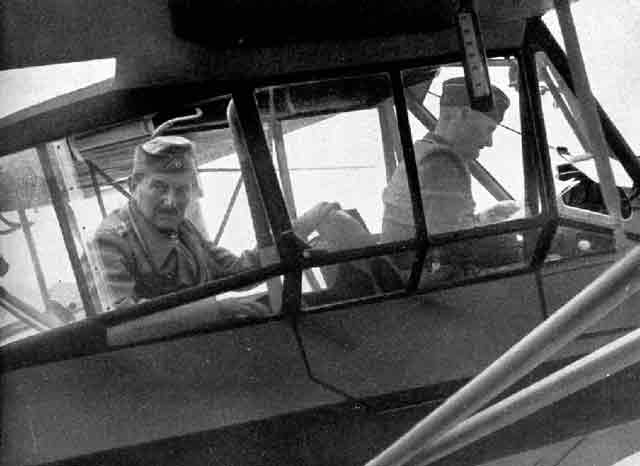Friday 14 November 1941
 |
| HMS Ark Royal sinks near Gibraltar on 14 November 1941 after being torpedoed by U-81 (Kptlt. Friedrich Guggenberger) on 13 November (colorized). |
Battle of the Mediterranean: Royal Navy aircraft carrier HMS Ark Royal, torpedoed by U-81 (Friedrich Guggenberger) on the 13th, rolls over and sinks on 14 November 1941. The location is pinpointed in 2002 as being 30 nautical miles east of Gibraltar. Guggenberger is in a position to sink the Ark Royal due to intelligence reports from the U-boat command in Paris. The Captain of the Ark Royal, Loben Maund, will be court-martialled in February 1942 for negligence. He will be found guilty on two counts of negligence: one of failing to ensure that properly constituted damage control parties had remained on board after the general evacuation, and one of failing to ensure the ship was in a sufficient state of readiness to deal with possible damage. Only one man out of the 1488 crewmen on board loses his life due to the lengthy time it takes the ship to sink.
Eastern Front: There are many oft-overlooked truths in a military campaign, and perhaps the most significant truth is the importance of supplies. As Napoleon famously said:
An army marches on its stomach. To be effective, an army relies on good and plentiful food.
There are many correlations between Napoleon's 1812 invasion of Russia and Hitler's 1941 invasion. The influence and effects of supply problems may be the biggest of them all. The difficulty in this subject is that logistical issues are not "sexy." They usually become sterile discussions of production and transportation that are important in the background to battles and campaigns but function well enough to never be noticed. It is much more gripping to talk about bombing raids or tank raids or surrenders, when, in fact, all of those moments of glory are determined in the final analysis by logistics. In late 1941, however, logistics take center stage in Russia.
 |
| A German truck stuck in the mud outside Moscow, November 1941 (Britting, Federal Archive Fig. 183-B15500). |
Put bluntly, the German supply network in the Soviet Union is beginning to break down by
14 November 1941. At the Orsha Conference on 13 November, where future German strategy is discussed, these supply difficulties were discussed with chiefs of staff from the army groups and a number of individual armies. These problems are not being resolved and in fact, are getting worse as each day passes. Thus, the continuation of Operation Typhoon into the winter ordered at the Orsha Conference appears almost to be a desperate attempt to achieve victory before the supply chain degrades to a point where the armies are being literally and figuratively starved. Having better and more plentiful weapons is useless if those weapons receive no ammunition, and having more effective soldiers is of no benefit if they do not have enough to eat or proper clothing in which to stay warm during sub-zero temperatures.
 |
| "25-pdr field guns of 408th Battery, 146th Field Regiment, Royal Artillery, at Littlehampton in Sussex, 14 November 1941." (© IWM (H 15593)). |
Today, General Franz Halder, who administered the Orsha Conference, amplifies in his war diary on the supply issues discussed at the Orsha Conference. He writes that Quartermaster-General Eduard Wagner rather dire description of the supply situation was no exaggeration. Halder writes that Wagner discusses with him:
Organizational consequences of the truck situation (the Divs. now have only horse-drawn trains; truck columns pooled in Armies).
This suggests a growing triage situation of supply - divisions are being left to fend for themselves while the supplies that can be delivered are going straight from the railheads to the army headquarters. With frigid weather closing in, supplies such as gasoline and winter clothing and spare parts to replace those that freeze become critical.
 |
| "One of Singapore's 15-inch coast defense guns firing, 14 November 1941." © IWM (K 755). |
The supply situation is not just affecting the Germans, but it is a false equivalence to say that the Red Army is facing the same issues as the Wehrmacht. The Soviets have a secure, intact supply network coming over railway systems that all converge on Moscow (one of the reasons that the Soviet capital always has been an important objective despite Hitler's long denials of that fact). The Germans, however, are trying to use railways that have been destroyed. The Soviet railway gauge is different than the German gauge, so trains from Berlin cannot just continue straight to the outskirts of Moscow. Instead, cargoes must be reloaded onto captured Soviet trains which can proceed only as far as the tracks have been repaired. Well, that is all well and good and can be accomplished with some slave labor, but the greater problem is that the Germans haven't captured enough Soviet trains and there aren't enough Soviet trainmen to run them. This requires transferring Germans from the German rail system to run the Soviet trains - and nobody wants to suddenly go run trains in a war zone in winter. The German army heads complain that the trains wind up being run by the "culls of the entire rail system." The bottom line is that the German Army is organized to run by trains, and train service is severely lacking in the conquered territories.
 |
| A German propaganda photo showing Junkers Ju-87 Stukas flying past and a Messerschmitt Br 108B "Taifun" (Typhoon) liaison aircraft on the ground to the left. Written on the back of the photo in German is the caption "Bombers return!" The Bf 108 later became known as the Nord 1000 Pingouin. The Bf 108 looks very much like the Bf 109 and often stands in for it in movies. However, only about 885 were built, compared to 33,984 Bf 109s (Berliner Verlag / Archive). |
The German supply issues in the East are causing insidious problems throughout the areas of the German occupation. It is not just the Wehrmacht soldiers who are suffering without sufficient winter clothing and other supplies. The Soviet POWs - literally millions of them - are getting almost nothing and they are serving as a sort of "canary in the coal mine" as to what awaits the Wehrmacht itself. Halder notes in his diary today after a stop at Molodeczno, Belarus on his way home from the Orsha Conference:
Typhus camp of Russian POWs (20,000) doomed to die. Several German doctors fatally ill. In other camps in the neighborhood no typhus, but every day many prisoners die from starvation. Ghastly picture, but relief appears impracticable at the momen.
Halder also stops at Kovno and gets a similar story there:
Colonel Just, Area Commander. Confirms earlier story of self-seeking policy of the civil administration and intrigues against the Army. Plight of POWs. Typhus in POW camps.
The desperate German drive on Moscow, where there would be plenty of ways to get through the winter, is beginning to take on the aspect of a fight for survival as much as one of conquest.
 |
| Christian theologian Reinhold Niebuhr (pictured) speaks at an American Friends of German Freedom dinner on 14 November 1941. Eleanor Roosevelt also speaks. The general idea presented at the dinner is that despite the course being pursued by Hitler, Germany should not be destroyed after the war. |
November 1941November 1, 1941: Finns Attack Toward Murmansk RailwayNovember 2, 1941: Manstein Isolates SevastopolNovember 3, 1941: Japan Prepares to AttackNovember 4, 1941: German Advances in the SouthNovember 5, 1941: Last Peace Effort By JapanNovember 6, 1941: Stalin Casts Blame in an Unexpected DirectionNovember 7, 1941: Stalin's Big ParadeNovember 8, 1941: Germans Take TikhvinNovember 9, 1941: Duisburg Convoy DestructionNovember 10, 1941: Manstein Attacks SevastopolNovember 11, 1941: Finland's Double Game EruptsNovember 12, 1941: T-34 Tanks Take ChargeNovember 13, 1941: German Orsha ConferenceNovember 14, 1941: German Supply Network Breaking DownNovember 15, 1941: Operation Typhoon ResumesNovember 16, 1941: Manstein Captures KerchNovember 17, 1941: Finland Halts OperationsNovember 18, 1941: British Operation CrusaderNovember 19, 1941: Sydney vs. Kormoran DuelNovember 20, 1941: The US Rejects Final Japanese DemandNovember 21, 1941: Germans Take RostovNovember 22, 1941: Kleist in Trouble at RostovNovember 23, 1941: Germans Take Klin, Huge Battle in North AfricaNovember 24, 1941: Rommel CounterattacksNovember 25, 1941: HMS Barham SunkNovember 26, 1941: Japanese Fleet SailsNovember 27, 1941: British Relieve TobrukNovember 28, 1941: Rostov Evacuated, German Closest Approach to MoscowNovember 29, 1941: Hitler Furious About RetreatNovember 30, 1941: Japan Sets the Date for its Attack2020










